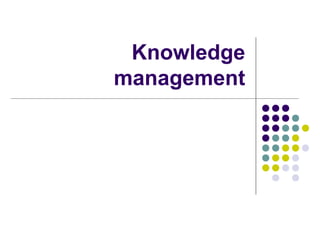
Knowledge management
- 2. What is Knowledge management? “knowledge management is systematic, explicit and deliberate building , renewal and application of knowledge to maximize an enterprise knowledge-related effectiveness and returns from its knowledge assets” “Knowledge management is a systematic and organized attempt to generate knowledge within an organization, that can transform its ability to store and use knowledge for improving performance”
- 3. Architecture Explicit knowledge Implicit knowledge
- 4. Explicit knowledge Defines the identity , the competences and the intellectual assets of an organization independently of its employees It is formal knowledge that can be packaged as information It can be found in the documents of an organization- reports, articles, manuals, patents, pictures, video images, sound, software etc. It can grow and sustain only with the help of tacit knowledge Acquisition of this knowledge is indirect
- 5. Implicit knowledge It is personal knowledge embedded in individual experience and is shared and exchanged through direct, face-to-face contact It is deeply rooted in the individual’s actions, experience, as well as in the ideals, values and emotions It is the practical knowledge to get things done
- 6. Types of implicit knowledge Technical dimension: Consists of informal skills and crafts hard to document Cognitive dimension: Consists of mental models, beliefs and perception that are so ingrained in people
- 7. Characteristics of knowledge management architecture A successful knowledge management architecture must be: Available (if knowledge exists, it is available for retrieval) Accurate in retrieval (if available, knowledge is retrieved) Effective (knowledge retrieved is useful and correct) Accessible (knowledge is available during the time of need)
- 8. KM tools Intranet technology Electronic document management Information retrieval tools Workflow management system Data analysis Data warehousing Agent technology Help desks Machine learning Computer based training
- 9. KM process 1. Identify stage Determine the competences critical to success –e.g., customer needs, expectation, finances, products and services Related strategies and knowledge domains are identified Knowledge domains and specialized subject matter areas where recognized experts can demonstrate superior performance Existing levels of expertise in the workforce are determined for each knowledge domain Gap between the existing and required expertise is determined The domain experts with training and IT professionals construct educational programmes and performance support systems to improve expertise levels
- 10. 2. Collect stage Acquiring existing knowledge, skills, theories, and experience needed to create the selected core competences and knowledge domains The knowledge, expertise must be made explicit Practitioners should know where and how to purchase explicit knowledge in the form of databases and expert system Valid knowledge resources should be identified to acquire expertise
- 11. 3. Select stage Takes the continuous stream of collected and formalized knowledge and assess its knowledge It should have a strong filtering mechanism Diversity of viewpoints from multiple domain experts is represented One framework should be selected as the basis for organizing and classifying knowledge repository
- 12. 4. Store stage It picks up the knowledge classifies’em and adds it to the organizational memory This corporate memory resides in different forms in human minds, paper, electronically Knowledge must be organized and represented in different knowledge structures within the repository
- 13. 5. Share stage Retrieves knowledge from corporate memory and makes it accessible to uses Workforce make their need and personal interest known to the corporate memory which automatically distributes any new knowledge to the company Individual groups, departments share ideas, opinions, gossip, knowledge and expertise in meetings
- 14. Knowledge conversion Tacit-tacit Tacit-explicit Explicit to tacit Explicit-explicit
- 15. Developing new knowledge Securing new and existing knowledge Distributing knowledge Combing available knowledge